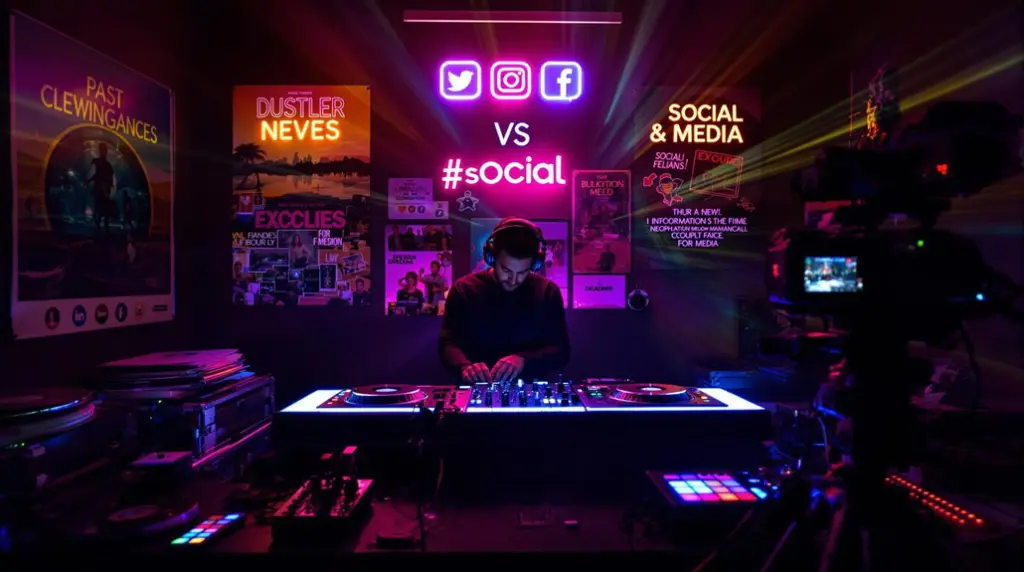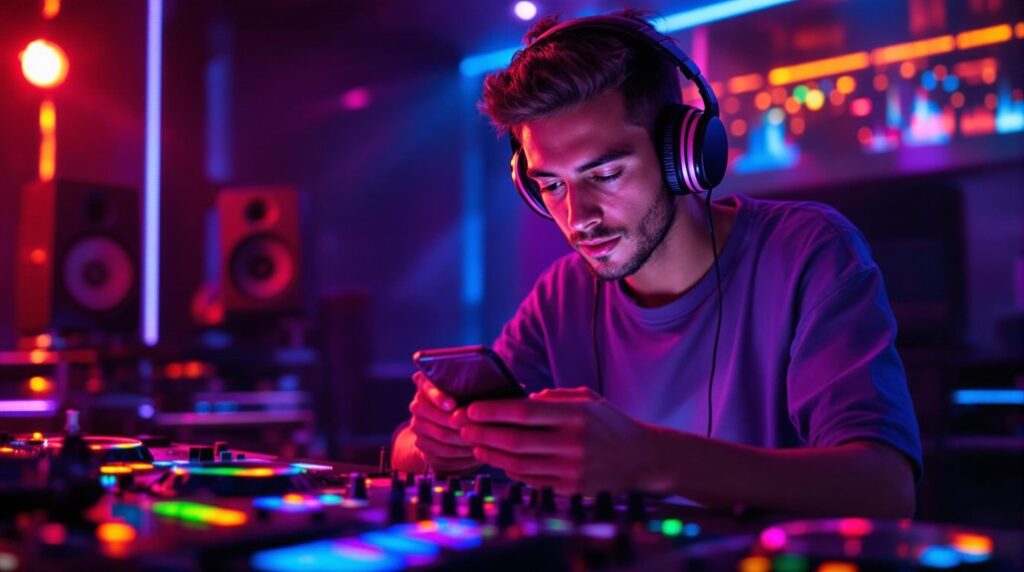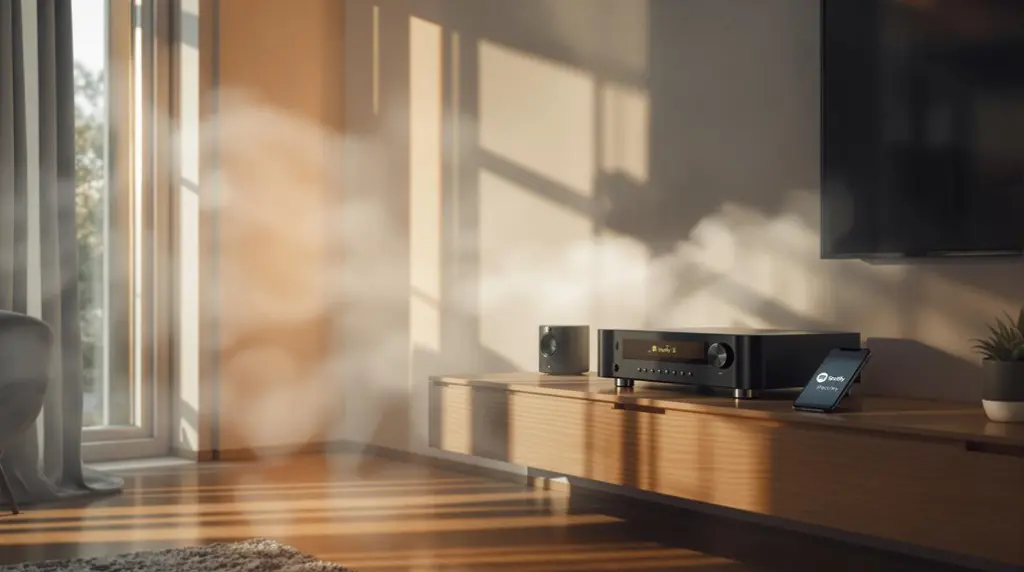DJs source their music through various channels, each essential to crafting unique sets and staying ahead in the industry. DJ download pools like DJCity offer curated, high-quality tracks and remixes often not available elsewhere. Specialist music stores such as Traxsource focus on electronic dance genres, ensuring cutting-edge selections. Streaming services and platforms like Spotify and Beatport LINK integrate directly with DJ software, while vinyl and CDs remain cherished for their analog charm. Networking with record labels and direct artist connections yield exclusive releases. Social media platforms and TikTok trends also play a key role in discovering what’s next. Discover how these resources shape the DJ landscape.
Key Takeaways
- DJs utilize DJ download pools for curated, high-quality audio files and exclusive remixes, ensuring legal music acquisition.
- Specialist music stores like Beatport offer electronic dance music collections with exclusive remixes and high-quality formats.
- Streaming services, such as Spotify, provide extensive libraries, though audio quality may vary compared to dedicated pools.
- Direct artist connections allow DJs to access unreleased tracks and remixes, enriching their music repertoire.
- Social media platforms like TikTok help DJs discover trending tracks and emerging music trends.
DJ Download Pools
In the dynamic world of music performance, DJ download pools have emerged as indispensable resources for modern DJs, offering an array of benefits that extend far beyond mere music access.
These digital platforms provide curated libraries filled with high-quality audio files essential for live performances, guaranteeing DJs have legal access to exclusive remixes and edits unavailable elsewhere. With the integration of AI technologies in DJ software, accessing and managing these curated libraries has become even more efficient.
The benefits of DJ pools are multifaceted, with their subscription models offering a cost-effective solution for staying current with the latest music trends.
Popular DJ pools like DJCity, BPM Supreme, and Digital DJ Pool provide unlimited downloads for a subscription fee, making them a financially savvy choice for DJs. This model not only keeps costs in check but also allows DJs to build extensive, genre-specific collections that align with their unique performance styles.
Such tailored offerings enhance the DJ’s ability to connect with audiences by delivering precisely the music they crave.
Moreover, these pools operate legally, compensating artists and labels to guarantee tracks are cleared for public performance, protecting DJs from potential copyright pitfalls.
Enhanced integration with DJ software such as Rekordbox and Serato further enriches the experience, enabling streamlined track management and seamless music access.
Specialist Music Stores
While DJ download pools offer a broad range of benefits for modern DJs, specialist music stores present an equally compelling avenue for accessing high-quality music. Platforms like Traxsource and Beatport have carved out a niche by focusing on curated collections tailored specifically for the diverse world of electronic dance music.
These stores are not just repositories of tracks; they are treasure troves where DJs can find precisely what they need, from deep house to techno, guaranteeing their playlists resonate with the right audience. The user-friendly features found in some top DJ software enhance the experience of discovering and managing music from these stores.
The allure of specialist music stores lies in their ability to provide high-quality audio files in formats designed for professional use, often featuring exclusive remixes and edits unavailable on mainstream platforms. This exclusivity offers DJs a competitive edge, allowing them to stand out with unique sounds and innovative mixes.
Furthermore, genre-specific charts and playlists further streamline the search process, making it easier for DJs to identify and integrate trending tracks into their sets. Additionally, platforms like Bandcamp empower DJs to support independent artists directly, creating a symbiotic relationship that fosters creativity and innovation.
With regular updates and promotions, these specialist stores guarantee DJs’ music libraries remain fresh, diverse, and full of potential for every gig.
Streaming Services
Streaming services have revolutionized the way DJs access and explore music, offering a vast and dynamic library that caters to an ever-evolving audience. Platforms like Spotify and TIDAL provide an extensive selection, with Spotify engaging over 551 million active monthly listeners and TIDAL featuring a staggering 100 million songs. This abundance allows DJs to experiment with diverse musical landscapes, uncovering fresh tracks through expertly curated playlists and personalized algorithms.
Some DJs also utilize free DJ software solutions like Mixxx or Serato DJ Lite to seamlessly integrate these tracks into their mixes. These tools assist DJs in staying ahead of trends and discovering new sounds to incorporate into their sets.
However, a consideration for DJs utilizing these services is the streaming quality. While convenient for exploring new music, the audio quality often falls short compared to dedicated DJ pools, which can impact the vibrancy of live performances. Despite this, services like Beatport LINK offer a DJ-centric solution, with its vast catalog and exclusive edits tailored for professional use.
Moreover, platforms such as SoundCloud and YouTube serve as goldmines for remixes and original content from emerging artists, enabling DJs to infuse their sets with unique and innovative sounds.
TikTok, too, has emerged as a powerful discovery tool, with trending tracks influencing setlists globally.
Record Label Access
Building strong relationships with record labels is an essential avenue for DJs to access exclusive tracks and rare edits that can enhance their performances. These label partnerships often begin with strategic networking, allowing DJs to join promotional mailing lists where they receive new releases ahead of public distribution. This early access not only enriches a DJ’s setlist but also positions them as tastemakers within the music scene.
Record labels implement robust promotional strategies, providing DJs with promotional copies to gather feedback and support for their artists. This mutual relationship benefits both parties—labels get market insights, while DJs gain exclusive content that boosts their performances. Many labels have dedicated programs or online portals specifically designed for DJs, enabling them to download high-quality audio files and remixes directly, thereby maintaining a competitive edge.
Engaging with artists within these labels can further deepen these connections. Through such collaborations, DJs might receive unique edits or remixes, adding a distinctive flair to their sets.
Additionally, attending label-hosted events, showcases, and listening parties presents invaluable opportunities for DJs to discover new music and expand their industry network, solidifying their presence within the music community.
Social Media Platforms
In the digital era, social media platforms have become indispensable tools for DJs seeking to discover new releases and connect with artists.
TikTok and SoundCloud, with their vibrant communities and innovative features, empower DJs to tap into the pulse of emerging music trends, while YouTube and Facebook facilitate networking and content sharing within the industry.
Meanwhile, Instagram provides a window into the latest releases and exclusive content, allowing DJs to stay ahead in an ever-evolving musical landscape.
Discovering New Releases
Social media ecosystems have become instrumental in the discovery of new music releases for DJs, serving as dynamic platforms that connect them with emerging sounds. TikTok, for instance, capitalizes on music trends and viral hits, offering DJs a treasure trove of potential tracks that can electrify their sets. By leveraging trending hashtags, DJs can stay ahead of the curve, tapping into the pulse of what resonates with audiences globally.
Instagram and Facebook further enrich the DJ’s toolkit by providing real-time updates from artists, record labels, and influencers. This constant stream of information keeps DJs informed about new releases, remixes, and exclusive tracks that might otherwise fly under the radar. Meanwhile, Twitter acts as a hub for industry conversations, where DJs can engage with peers and artists to discuss and share insights on new music drops and overarching industry trends.
Platforms like SoundCloud and YouTube also play significant roles in music discovery. SoundCloud fosters a collaborative music discovery process, while YouTube provides visual inspiration through live performances and set videos, introducing DJs to fresh sounds that can captivate audiences.
| Platform | Main Feature | Benefit for DJs |
|---|---|---|
| TikTok | Trending hashtags | Discover viral hits |
| Follow artists and labels | Real-time updates on new releases | |
| SoundCloud | Access to independent remixes | Direct interaction with creators |
Networking With Artists
As DJs navigate the ever-evolving landscape of music discovery, they find that engaging directly with artists through social media platforms offers unparalleled opportunities for growth and collaboration. Social media has revolutionized how DJs connect with artists, turning platforms like Instagram and Twitter into indispensable tools for exploring artist collaborations.
By following their favorite artists, DJs can gain real-time insights into upcoming releases and investigate the creative processes behind the music. This direct interaction not only fosters personal connections but also lays the groundwork for potential collaborations that can enhance a DJ’s repertoire.
Online communities, such as Facebook groups dedicated to DJs, serve as vibrant networking hubs. Here, DJs can discover exclusive tracks, share insights, and promote their own work, creating a dynamic ecosystem of creativity and support.
TikTok, with its viral challenges, has emerged as a powerful medium for discovering trending tracks and emerging artists, offering DJs fresh content to incorporate into their sets. Meanwhile, LinkedIn provides a more professional avenue for building relationships with industry insiders, including labels and promoters, opening doors to further music opportunities.
Engaging with artists via SoundCloud or Bandcamp comments can also lead to fruitful partnerships and access to unreleased tracks.
Exclusive Content Access
Harnessing the power of social media, DJs now have unprecedented access to exclusive content that can enhance their performances and set them apart in a competitive industry. Platforms such as TikTok and Instagram have become essential tools in music promotion strategies, where DJs can discover emerging tracks and trending sounds.
TikTok, in particular, utilizes hashtags to spotlight new music and artists, providing a dynamic avenue for DJs to curate digital content that resonates with their audience.
Artists increasingly use these platforms to release exclusive mixes and remixes, granting DJs access to unique material not readily available on traditional music outlets. This trend underscores the importance of digital content curation as DJs sift through a vast array of offerings to find sounds that define their brand.
Facebook groups further enrich this ecosystem by fostering communities where DJs share links to free downloads, exclusive tracks, and new releases, encouraging collaboration and innovation.
SoundCloud enhances this landscape by allowing DJs to follow artists directly, securing early access to exclusive tracks and unreleased material. Engaging with artists via social media also opens networking opportunities, enabling DJs to gain firsthand insights about upcoming releases, thereby maintaining a competitive edge in the ever-evolving music scene.
Physical Music Formats
In the ever-evolving landscape of music consumption, physical music formats like vinyl records and CDs continue to hold a distinctive place in the hearts of DJs, cherished for their unparalleled sound quality and the tactile, hands-on experience they offer during performances.
Vinyl collecting has seen a resurgence, with sales reaching approximately 41 million units in the U.S. in 2022. This trend underlines a preference among DJs for the analogue warmth and depth that vinyl uniquely provides, qualities not easily replicated by digital formats. The act of spinning vinyl during a set not only enriches the auditory experience but also offers an engaging, almost ritualistic connection with the music.
While CDs are gradually becoming obsolete as DJ equipment moves towards digital integration, their legacy as a once-dominant format is undeniable.
Despite this shift, physical formats remain a treasure trove for DJs willing to scour second-hand record stores, thrift shops, and markets. These venues offer opportunities for unexpected finds, enriching a DJ’s library with rare tracks that might not exist in digital formats.
Beyond building diverse collections, this exploration fosters community engagement through activities like crate digging, immersing DJs in vibrant local music scenes and culture.
Direct Artist Connections
For DJs steering through the modern music industry, cultivating direct connections with artists is an invaluable strategy that offers access to exclusive and unreleased tracks. In an era where music exclusivity is a powerful asset, DJs can leverage artist collaboration to enhance their sets with unique remixes and edits. Social media platforms and official artist websites have become essential tools for DJs seeking these direct connections. By reaching out, DJs can secure a place on mailing lists or gain early access to new releases, often becoming the first to spin fresh tracks at their gigs.
Networking remains vital. Engaging with musicians at music events, festivals, and gigs can lead to fruitful partnerships, often resulting in the receipt of exclusive tracks or promotional offers. Platforms like Bandcamp further facilitate this connection, allowing DJs to support artists directly while accessing unique and often unreleased music. Such interactions not only enrich a DJ’s music library but also foster meaningful relationships within the industry.
| Strategy | Benefit |
|---|---|
| Social Media Outreach | Access to unreleased tracks |
| Networking at Events | Exclusive tracks and promotions |
| Bandcamp Engagement | Direct artist support and exclusivity |
This symbiotic relationship between DJs and artists underscores the significance of direct connections in cultivating a rich, exclusive musical repertoire.
Frequently Asked Questions
How Do Most DJS Get Their Music?
Most DJs engage in music acquisition through digital platforms like DJ pools and Beatport, facilitating genre exploration. Vinyl hunting in record shops and utilizing free platforms like SoundCloud further enrich their collections with diverse and unique sounds.
Where Do Top DJS Get Their Music?
Top DJs acquire tracks through music licensing agreements, curating digital crates from streaming services and music blogs. They leverage relationships with record labels and underground networks for exclusive access, while artist promotions further enrich their unique musical collections.
Where Do DJS Get Their Music Files?
DJs acquire music files from diverse avenues, leveraging digital libraries and music sourcing platforms. These include DJ pools, specialist download stores, and streaming services, ensuring access to curated, high-quality tracks for dynamic live performances and audience engagement.
Where Do DJS Get Their Samples?
DJs access samples from diverse sources, including specialized sample libraries and Creative Commons platforms, offering legal, high-quality sounds. These resources empower DJs to craft unique mixes, enhancing creativity and innovation within the dynamic landscape of music production.
Conclusion
In the dynamic world of DJing, the acquisition of music is a multifaceted endeavor, drawing from a variety of sources that each offer unique advantages. DJ download pools provide curated selections, while specialist music stores and streaming services offer extensive catalogs. Record label access grants exclusive tracks, and social media platforms facilitate discovery and networking. Physical formats preserve the tactile tradition, and direct artist connections foster collaboration. These diverse avenues collectively empower DJs to craft innovative and engaging musical experiences.




